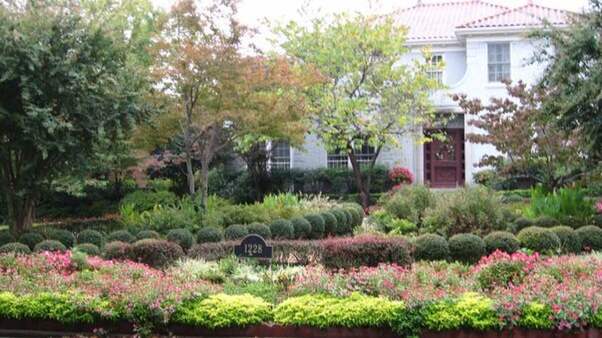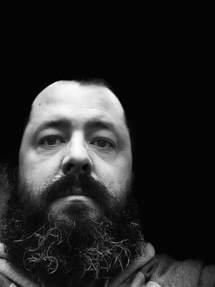 My dad's artwork in my friend Patti's yard. My dad's artwork in my friend Patti's yard. We moved into our current home nearly a decade ago. I began working hard in the yard right away, trying to live up to the legacy of beauty my father (a landscape artist, truly) instilled in me. This earned the friendship of my neighbor across the street who was also much devoted to her garden. In the years since, she’s been occupied several days a week, cultivating the flowering of her property. Untold hours were spent there, laboring and loving and creating. This past summer our neighbor sold her home and moved away. The new neighbors, a young couple just getting started, tore out all of her flowers and shrubs. They’ve begun something good, but most of my first neighbor’s toil of is lost. Recently I was on Facebook, and saw a post from my old karate instructor and dear friend Patti regarding her previous home. She shared a picture of the landscaping. Impeccable, elegant, a marvelous ointment for the soul. My pops created the design and we worked together in that yard and many others for years, softening the suffering of the world with flowers and leaves and roots and trunks. Patti sold her home recently, and now her paradise is also gone, replaced by grass, boring and plain. Someone commented that it was like trashing a virtuoso painting. One of the last jobs my father ever did was for my aunt and uncle in Fort Worth, Texas. It was also a wonder, a truly uplifting and astounding touch of splendor. When they sold their home, the new owners also rendered my father’s art null by ripping it out for more asphalt. These are all very sad stories. They recall an account of Thomas Jefferson working so diligently to make Monticello a marvel, only for it to be overgrown within years of his death. Its grandeur has since been recaptured, perhaps, by the national park service, but one speculates that again in future those memories will be erased by war, or economic collapse or unseen consequences of climate change coming. Every single thing we build in this world, even our art, will pass away in its concrete form, though we try and hold on. It is mind-boggling to consider all the cultures and histories of the world that have already been destroyed and forgotten. Like the national park service at Monticello, my mother has tried to preserve her own yard, planted and cared for through the years by her beloved. She wants to hold on to the gifts he gave. But even in her yard, his, there is a slow fade, as if his voice is drifting slowly to a whisper before silence. She won’t live there forever, and one day new owners might annihilate my father’s vision once and for all. These truths can be hard. What use is there in living, in lifting feet to walk or hands to industry? I’ve been reading my father’s journals off and on through these desolate years since his passing. I want to read them slow. I want to have some piece of him yet to learn, some tone of voice or aching and jubilation of his soul for all of the days coming until I’m also on my way. He struggled with sadness and frustration and many other things, burdened like us all. His life was work, but it was also joy. He was frequently a failure, but he also pressed on. My pops did a lot of great things in this world. Some lingering beauty hovers among aging maples, mugos, crepe myrtles and privet, barberry, boxwood, yaupon and pine; thickening rings, limbs and blossoms will continue to remind of his hunger for awe in many yards across Texas and Oklahoma for decades to come. Some will outlive us. There are also a number of recordings beaming from sound systems in untold homes and cars that also testify to his commitment to worship God in song. My father was an artist, but he is mostly remembered for the good he gave to others. His art is loved because he was. We are told to accumulate treasure in heaven that cannot be touched by moth or rust. Even as I mourn the destruction of my father’s art I rejoice, for I know his humble offerings to others on behalf of his Lord are eternal; the changing of lives endures. I think a lot about the quality and quantity of my writing, but the question for me is not whether my art is beautiful. Rather, do I love? NOTE: I wrote this a while back, but thought that its message was appropriate for our current situation, which is one of gloom. Nevertheless, ‘love conquers all’, and if we’ll continue to reach across the social distancing to one another, we still retain great power of healing and hope. Press on. Blake
14 Comments
Linda L Birch
3/27/2020 10:30:04 am
Blake, Deep thoughts and so very well written. Thank you for sharing. May you and yours stay safe.
Reply
Jane Thomas
3/27/2020 12:13:14 pm
Blake! This is deeply beautiful and having been a recipient of his landscaping art, music, and the multitude of unique ways he gave us himself!
Reply
Blake
3/28/2020 08:38:07 am
Aunt Jane,
Blake
3/28/2020 08:35:48 am
Linda,
Reply
Donna Moore
3/28/2020 09:36:29 am
Blake,
Reply
Blake
3/28/2020 12:18:21 pm
Thanks Donna,
Reply
John Stalcup
3/28/2020 10:04:39 pm
My son Brian dearly loved your Dad and was influenced for t good by him.
Reply
Blake
3/30/2020 08:54:19 am
Thanks John.
Reply
Thanks for sharing this Blake. This puts words to the profound sense of loss while reminding us that everything beautiful is fleeting. It reminds me of the beginning of 1 Corinthians 13. Maybe Paul would say today, “If I create a masterpiece of art, but have not love, it is pointless work.” Your dad created many masterpieces. His greatest was the love he shared with us. I’m forever grateful for that.
Reply
Blake
3/30/2020 08:56:55 am
Dustin,
Reply
Jannah Bahgat
4/10/2020 10:15:46 pm
Mr. Kilgore,
Reply
Blake
4/11/2020 07:50:40 am
Jannah,
Reply
Kiarna
4/28/2020 04:09:14 pm
Greetings from Queensland, Australia.
Reply
Blake Kilgore
4/20/2021 09:49:31 am
Kiarna,
Reply
Leave a Reply. |
"Examine all things; hold on to the good."
-Saint Paul the Apostle Archives
September 2022
Categories |
